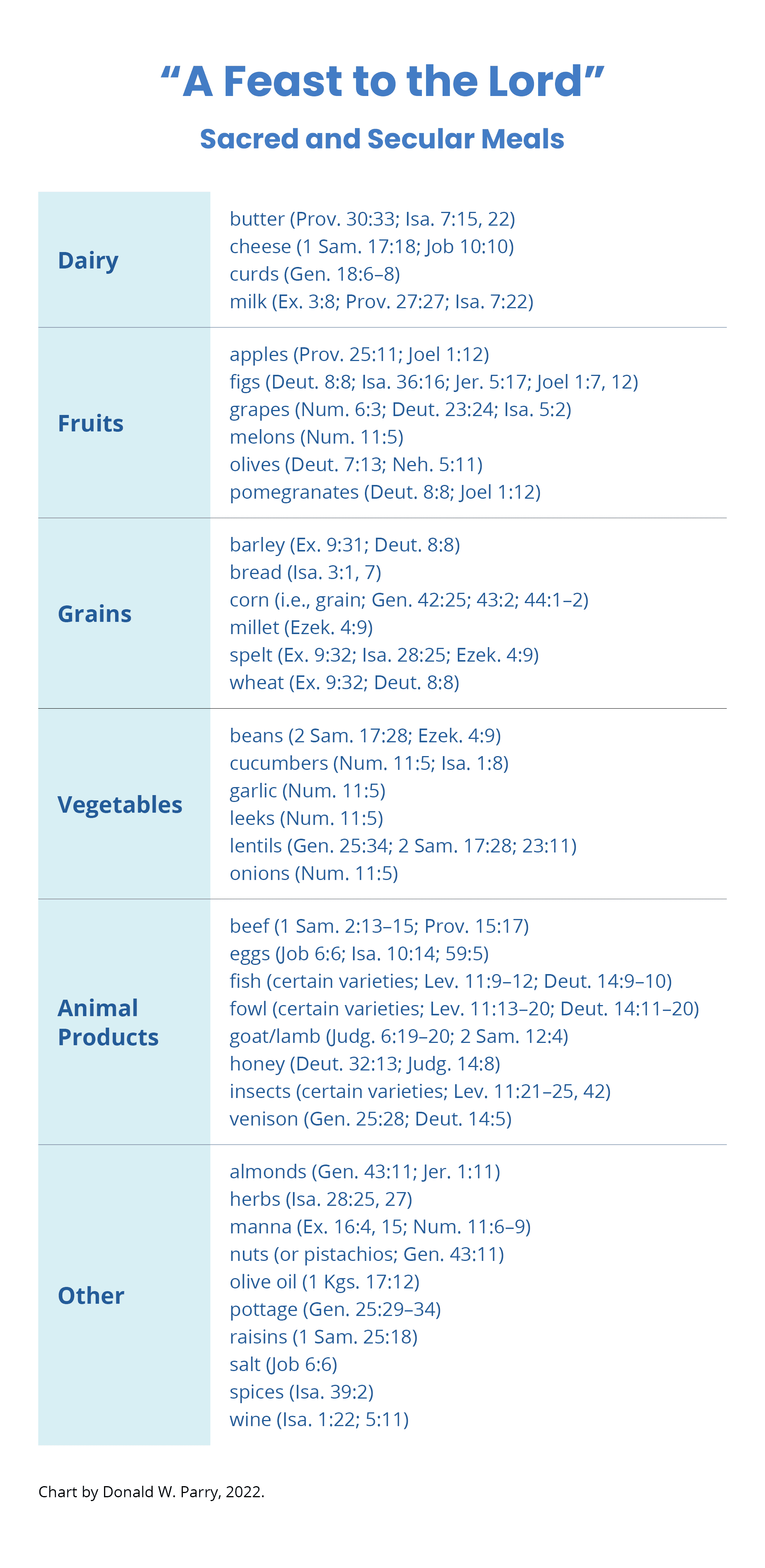Book
56 Chapters

Scholars describe the daily pattern of meals in ancient Israel: “Small bowls were used for eating and drinking. In biblical times the people ate three meals daily, differing noticeably in quantity. Breakfast was quite meager, consisting of only bread or fruit. The midday meal was light, composed of bread, grain, olives, and figs. . . . The main meal was eaten in the evening after sunset, following the day’s work, and the whole family participated.”[1]
The Old Testament identifies a variety of foods, including dairy, fruits, grains, vegetables, and animal products. The biblical writers referred to these foods in different settings, such as covenant-making ceremonies, the temple with its sacrificial structure, religious festivals, and in everyday life. Biblical foods served a range of functions:
1. To sustain life. Food was associated with health and life, rather than hunger and death. The ancients, therefore, earnestly sought God’s blessing in providing rain so that their crops would grow. The scriptures credit God with providing sustenance to His people (Gen. 1:29–30; 2:16; 48:15; 1 Kgs. 17:7–24; Ps. 104:14, 27–28), especially if they trusted in Him. The Psalmist wrote, “Trust in the lord, and do good; so shalt thou dwell in the land, and verily thou shalt be fed” (Ps. 37:3).
2. For enjoyment and pleasure. Individuals consumed food for pleasure in several settings, including during banquets or feasts. Samson made a feast in Timnath (Judg. 14:10), and Solomon held an elaborate feast with Israel in connection with the temple’s dedication (1 Kgs. 8:65). Several religious festivals, including the Feasts of Unleavened Bread, Weeks, and Tabernacles (Ex. 23:14–17), were celebrated with great feasts.
3. In the context of covenants and treaties. Examples include the agreement between Isaac and King Abimelech (Gen. 26:26–33), the pact between Laban and Jacob (Gen. 31:43–54), and the covenant setting where Moses, Aaron, and seventy elders of Israel ate and drank after seeing God on mount Sinai (Ex. 24:9–11; see also Ex. 18:12).
4. In settings where food had symbolic meaning. Similar to the manner in which some Christians partake of consecrated bread and wine, Old Testament worshippers ate lamb and unleavened bread during Passover, which was called “a feast to the lord” (Ex. 12:14; see also Ex. 17). Both the lamb and the bread had symbolic value in the manner in which they symbolized Jesus Christ. So, too, the eating of manna prefigured and symbolized Jesus’s descending from heaven as the bread of life (see John 6:48–51).
Dairy | butter (Prov. 30:33; Isa. 7:15, 22) cheese (1 Sam. 17:18; Job 10:10) curds (Gen. 18:6–8) milk (Ex. 3:8; Prov. 27:27; Isa. 7:22) |
|---|---|
Fruits | apples (Prov. 25:11; Joel 1:12) figs (Deut. 8:8; Isa. 36:16; Jer. 5:17; Joel 1:7, 12) grapes (Num. 6:3; Deut. 23:24; Isa. 5:2) melons (Num. 11:5) olives (Deut. 7:13; Neh. 5:11) pomegranates (Deut. 8:8; Joel 1:12) |
Grains | barley (Ex. 9:31; Deut. 8:8) bread (Isa. 3:1, 7) corn (i.e., grain; Gen. 42:25; 43:2; 44:1–2) millet (Ezek. 4:9) spelt (Ex. 9:32; Isa. 28:25; Ezek. 4:9) wheat (Ex. 9:32; Deut. 8:8) |
Vegetables | beans (2 Sam. 17:28; Ezek. 4:9) cucumbers (Num. 11:5; Isa. 1:8) garlic (Num. 11:5) leeks (Num. 11:5) lentils (Gen. 25:34; 2 Sam. 17:28; 23:11) onions (Num. 11:5) |
Animal Products | beef (1 Sam. 2:13–15; Prov. 15:17) eggs (Job 6:6; Isa. 10:14; 59:5) fish (certain varieties; Lev. 11:9–12; Deut. 14:9–10) fowl (certain varieties; Lev. 11:13–20; Deut. 14:11–20) goat/lamb (Judg. 6:19–20; 2 Sam. 12:4) honey (Deut. 32:13; Judg. 14:8) insects (certain varieties; Lev. 11:21–25, 42) venison (Gen. 25:28; Deut. 14:5) |
Other | almonds (Gen. 43:11; Jer. 1:11) herbs (Isa. 28:25, 27) manna (Ex. 16:4, 15; Num. 11:6–9) nuts (or pistachios; Gen. 43:11) olive oil (1 Kgs. 17:12) pottage (Gen. 25:29–34) raisins (1 Sam. 25:18) salt (Job 6:6) spices (Isa. 39:2) wine (Isa. 1:22; 5:11) |
Book
56 Chapters

Items in the BMC Archive are made publicly available for non-commercial, private use. Inclusion within the BMC Archive does not imply endorsement. Items do not represent the official views of The Church of Jesus Christ of Latter-day Saints or of Book of Mormon Central.